2025年甘肃省中考英语二轮复习题型突破课件:情景交际与图识标志(共59张PPT)
文档属性
| 名称 | 2025年甘肃省中考英语二轮复习题型突破课件:情景交际与图识标志(共59张PPT) | 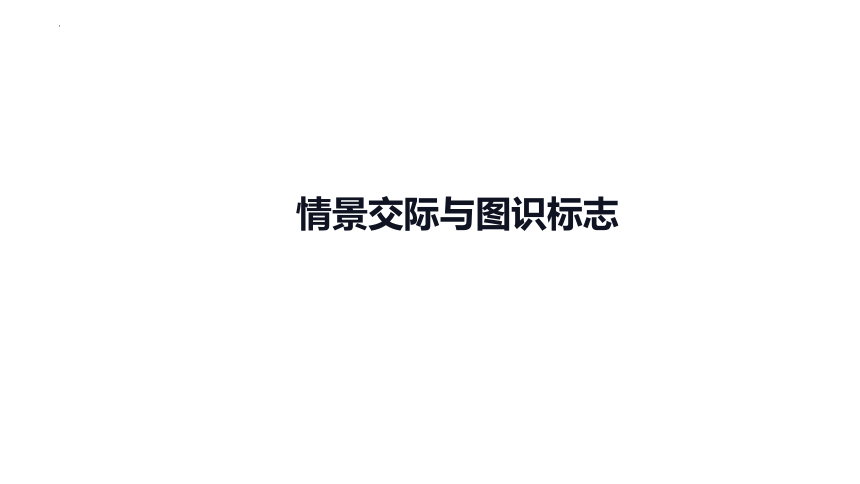 | |
| 格式 | pptx | ||
| 文件大小 | 1.3MB | ||
| 资源类型 | 教案 | ||
| 版本资源 | 通用版 | ||
| 科目 | 英语 | ||
| 更新时间 | 2025-01-11 21:39:20 | ||
图片预览

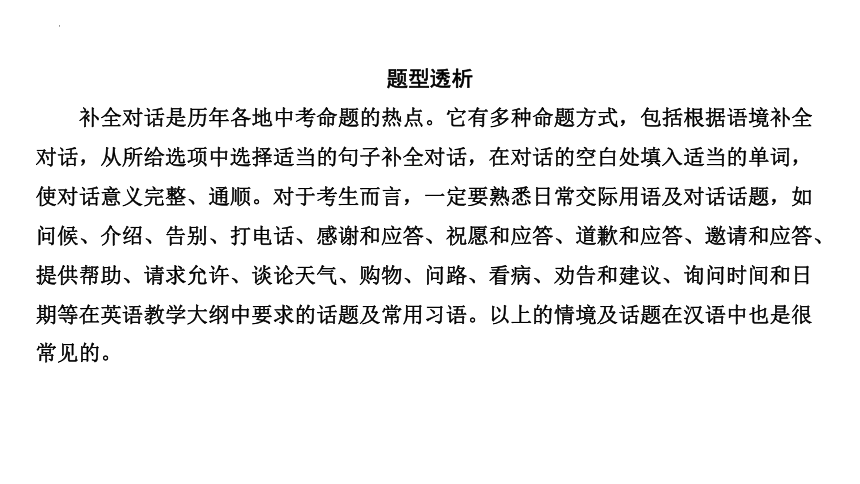
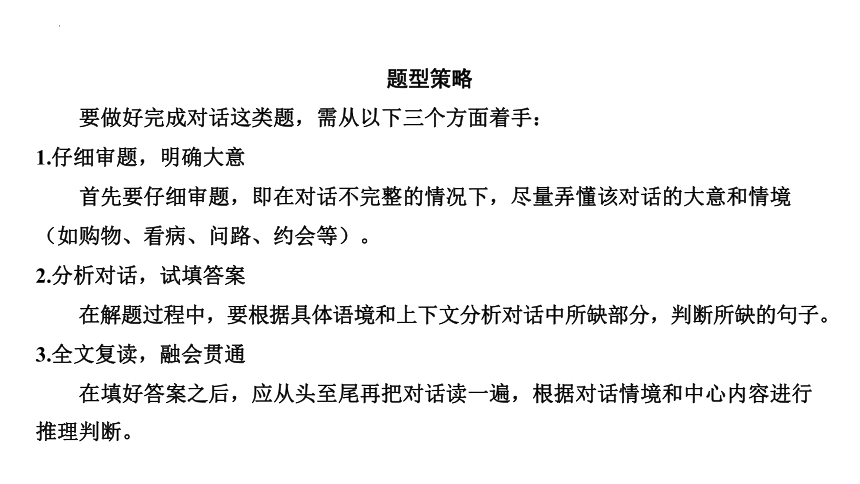
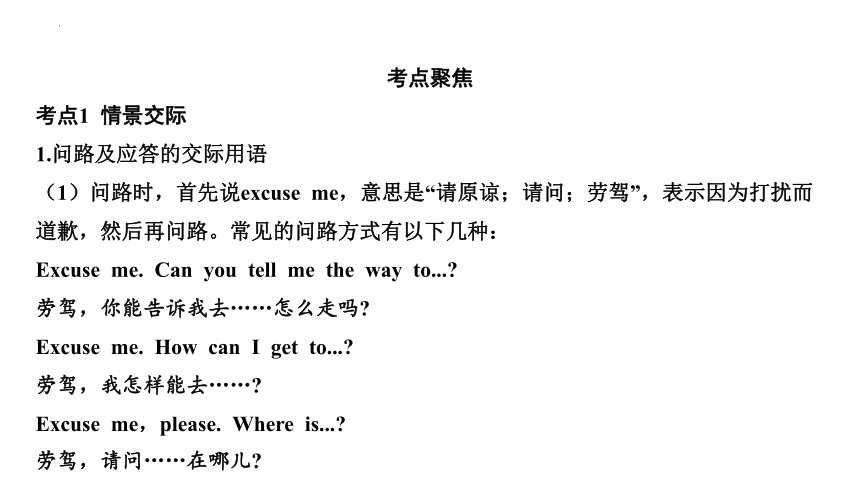
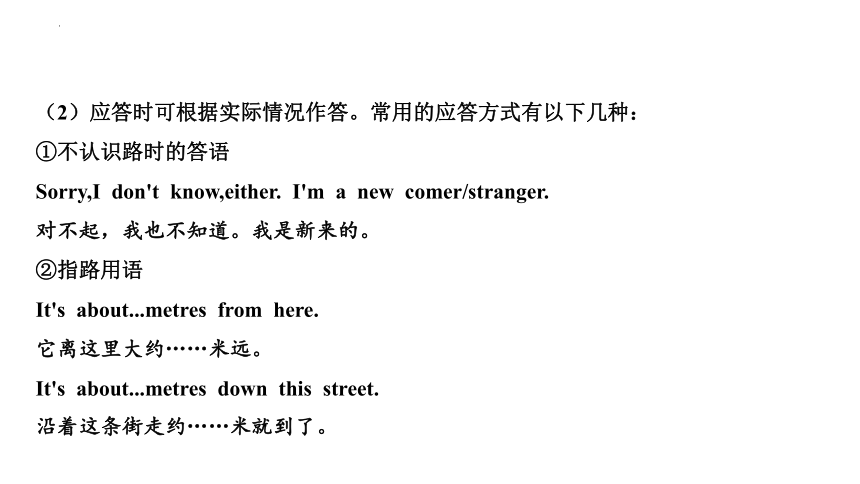
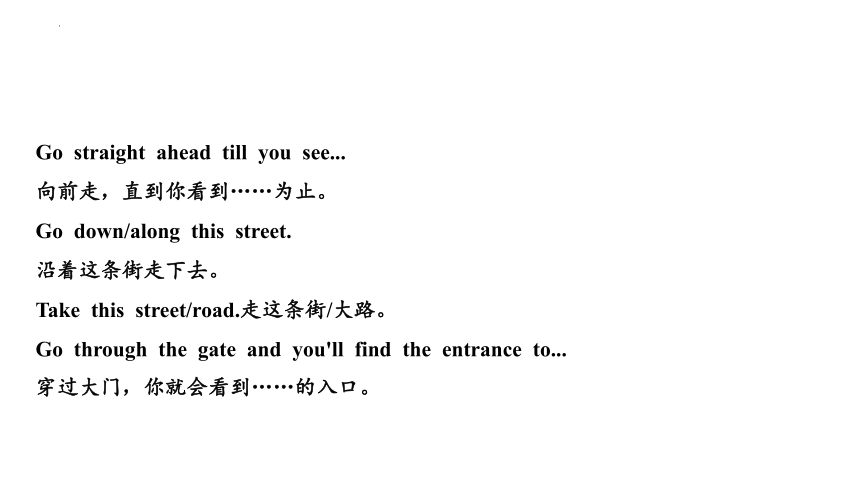
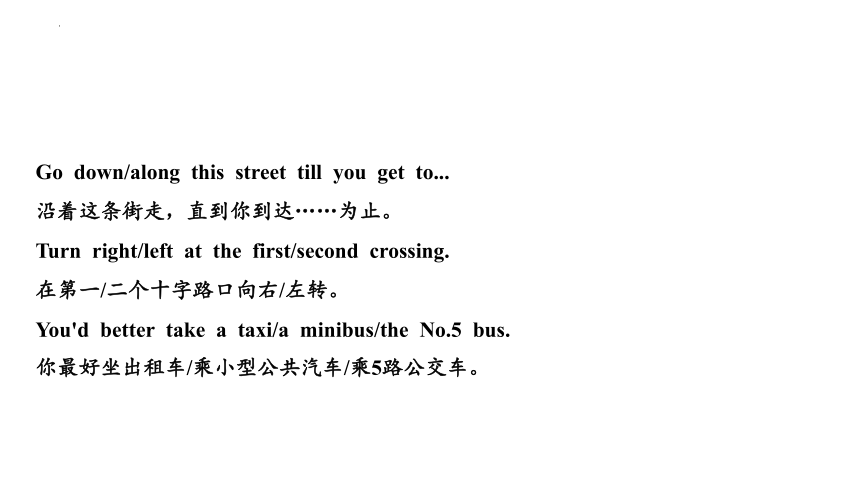

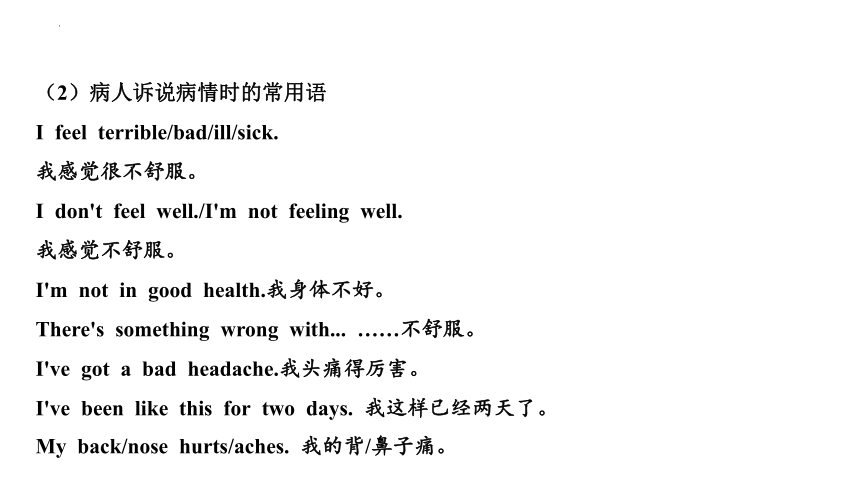
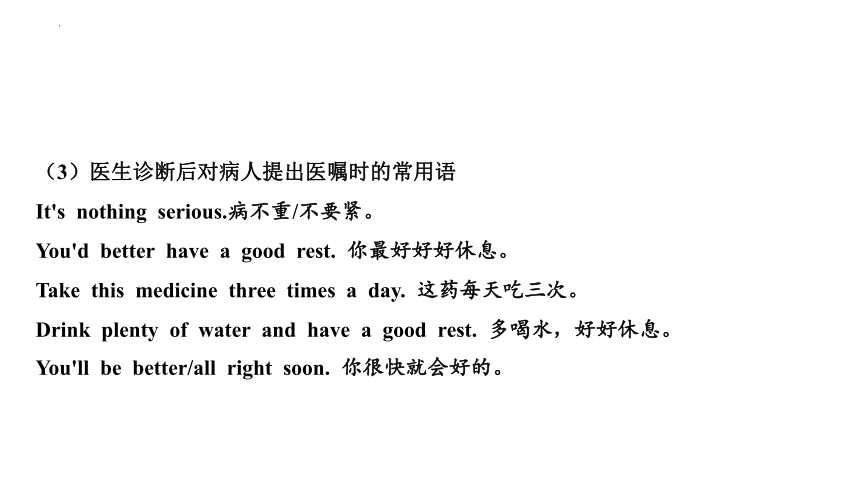
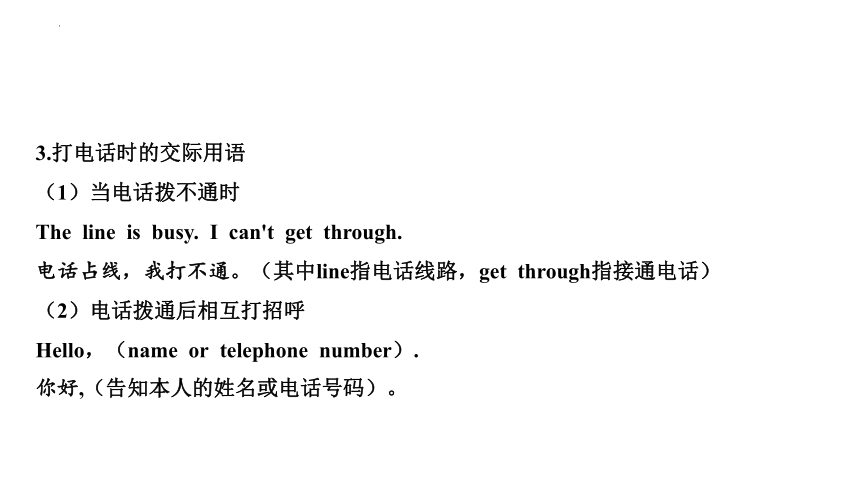
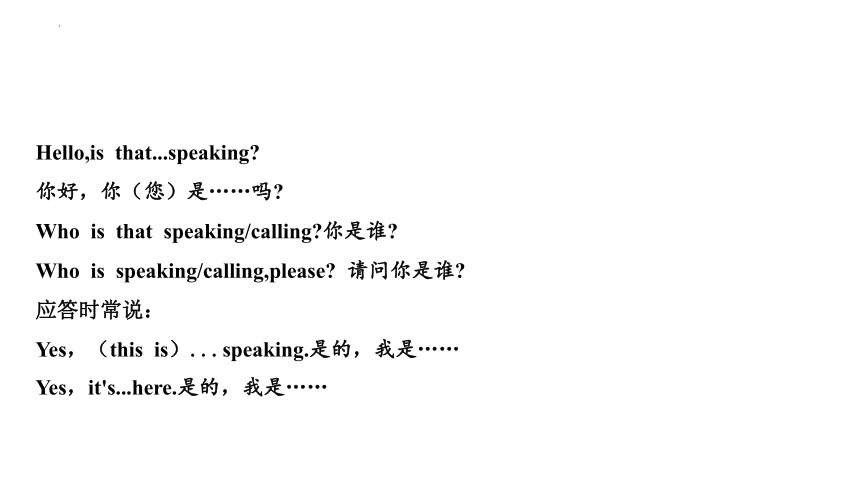
文档简介
(共59张PPT)
情景交际与图识标志
题型透析
补全对话是历年各地中考命题的热点。它有多种命题方式,包括根据语境补全
对话,从所给选项中选择适当的句子补全对话,在对话的空白处填入适当的单词,
使对话意义完整、通顺。对于考生而言,一定要熟悉日常交际用语及对话话题,如
问候、介绍、告别、打电话、感谢和应答、祝愿和应答、道歉和应答、邀请和应答、
提供帮助、请求允许、谈论天气、购物、问路、看病、劝告和建议、询问时间和日
期等在英语教学大纲中要求的话题及常用习语。以上的情境及话题在汉语中也是很
常见的。
题型策略
要做好完成对话这类题,需从以下三个方面着手:
1.仔细审题,明确大意
首先要仔细审题,即在对话不完整的情况下,尽量弄懂该对话的大意和情境
(如购物、看病、问路、约会等)。
2.分析对话,试填答案
在解题过程中,要根据具体语境和上下文分析对话中所缺部分,判断所缺的句子。
3.全文复读,融会贯通
在填好答案之后,应从头至尾再把对话读一遍,根据对话情境和中心内容进行
推理判断。
考点聚焦
考点1 情景交际
1.问路及应答的交际用语
(1)问路时,首先说excuse me,意思是“请原谅;请问;劳驾”,表示因为打扰而
道歉,然后再问路。常见的问路方式有以下几种:
Excuse me. Can you tell me the way to...
劳驾,你能告诉我去……怎么走吗
Excuse me. How can I get to...
劳驾,我怎样能去……
Excuse me,please. Where is...
劳驾,请问……在哪儿
(2)应答时可根据实际情况作答。常用的应答方式有以下几种:
①不认识路时的答语
Sorry,I don't know,either. I'm a new comer/stranger.
对不起,我也不知道。我是新来的。
②指路用语
It's about...metres from here.
它离这里大约……米远。
It's about...metres down this street.
沿着这条街走约……米就到了。
Go straight ahead till you see...
向前走,直到你看到……为止。
Go down/along this street.
沿着这条街走下去。
Take this street/road.走这条街/大路。
Go through the gate and you'll find the entrance to...
穿过大门,你就会看到……的入口。
Go down/along this street till you get to...
沿着这条街走,直到你到达……为止。
Turn right/left at the first/second crossing.
在第一/二个十字路口向右/左转。
You'd better take a taxi/a minibus/the No.5 bus.
你最好坐出租车/乘小型公共汽车/乘5路公交车。
2.看病时的交际用语
(1)医生询问病情时的常用语
What's wrong/the matter/the trouble with you
你哪里不舒服
Is there anything wrong with you
你哪里不舒服吗
How long have you been like this
你这样多长时间了
Do you have a fever 你发烧了吗
Have you taken your temperature
你量体温了吗
(2)病人诉说病情时的常用语
I feel terrible/bad/ill/sick.
我感觉很不舒服。
I don't feel well./I'm not feeling well.
我感觉不舒服。
I'm not in good health.我身体不好。
There's something wrong with... ……不舒服。
I've got a bad headache.我头痛得厉害。
I've been like this for two days. 我这样已经两天了。
My back/nose hurts/aches. 我的背/鼻子痛。
(3)医生诊断后对病人提出医嘱时的常用语
It's nothing serious.病不重/不要紧。
You'd better have a good rest. 你最好好好休息。
Take this medicine three times a day. 这药每天吃三次。
Drink plenty of water and have a good rest. 多喝水,好好休息。
You'll be better/all right soon. 你很快就会好的。
3.打电话时的交际用语
(1)当电话拨不通时
The line is busy. I can't get through.
电话占线,我打不通。(其中line指电话线路,get through指接通电话)
(2)电话拨通后相互打招呼
Hello,(name or telephone number).
你好,(告知本人的姓名或电话号码)。
Hello,is that...speaking
你好,你(您)是……吗
Who is that speaking/calling 你是谁
Who is speaking/calling,please 请问你是谁
应答时常说:
Yes,(this is)...speaking.是的,我是……
Yes,it's...here.是的,我是……
(3)打电话请对方找人或留言
Is...at home ……在家吗
Can/May/Could I speak to...,please
请……接电话好吗
Will/Would you give a message to..., please
请给……捎个口信好吗
Would you tell him my telephone number,please
请你把我的电话号码告诉他好吗
Can/Could you ask...to ring me back, please
请叫……给我回个电话好吗
应答时常说:
Hold on,please./Wait a minute,please./ One moment,please.
请稍等。
I'm sorry,...is not at home now.
对不起,……现在不在家。
Can I take a message for you
需要我帮你捎个口信吗
I'll ask him to call you back.
我会让他给你回电话。
4.表示劝告和建议的交际用语
(1)You'd better (not) do...
你最好(不要)做……
You should do...你应该做……
You need to do...你需要做……
(2)Why don't you do... /Why not do...
为什么不做……呢
这是以反问的方式提出劝告或建议,含有建议对方去做某事的意思,而不
是询问对方不去做某事的原因。
(3)“What/How about+名词或动词-ing形式 ”句型有征求对方意见的意思,多数
情况下是建议和对方一起做某事。
(4)“Shall we+动词原形+其他 ”句型用于建议对方与自己一起做某事,是一种普
通的表示建议的方法。它和“Let's...”句型可以互换,在回答时,如果赞成这个建议,
常用“Yes/OK,let's...”。
(5)以let's开头的祈使句
这是最普通的表达建议的方法,建议对方和自己一起做什么,let's后接动词原形。
句尾可加上shall we或OK等用于征求对方意见的词,使语气变得委婉。
①肯定答语:
Great!/Sounds great!太好了!
That's a good idea./Good idea.
真是个好主意。
Thanks for your advice!谢谢你的建议!
②否定答语:
I'm afraid that...我担心/恐怕……
I'm afraid not.恐怕不行。
I'd love to,but...我愿意,但是……
5.谈论天气情况的交际用语
天气是西方人日常谈论的话题,无论是熟人还是陌生人,都常以谈论天气开始对话。
It is raining/blowing/snowing,isn't it
下雨了/刮风了/下雪了,对吗
It is+adj./v.-ing(+today)./It+v.(第三人称单数形式)(+today).(今天)天
气……
以上这类句子都是用来发表对天气的看法的。“It is+adj./v.-ing(+today).”中
用表示天气情况的形容词或动名词词组,应答时可说“Yes,it is.”。
询问天气情况时可说:
What's the weather like today /How is the weather today
今天天气怎么样
What's the weather going to be like
天气将怎样
应答时可说:
It's fine/warm/cold/hot...
天气很好/暖和/很冷/很热……
It's going to be fine/warm/cold/hot...
天气将很好/暖和/很冷/很热……
6.请求允许及其应答的交际用语
(1)Can/Could/May I...
我可不可以……
这个是请求对方允许自己做某事的最普通的交际用语,其中“Could I... ”语气最委
婉;“May I... ”常用在比较正式的场合;“Can I... ”用得最广泛。
对于所提出的请求表示允许或同意时可说:
Yes./Sure./Certainly.当然可以。
Of course,you may.当然可以。
Yes,do please.请吧。
Go ahead,please.请吧。
That's OK./All right.好的。
对于所提出的请求表示不允许或不同意时可说:
No,please don't.请不要。
I'm sorry you can't.对不起,你不可以。
I'm sorry,but...对不起,但是……
You'd better not do...你最好别……
(2)Do you mind if I do...
如果我……你介意吗
当我们用“Do you mind if... ”时,if从句中的谓语动词一般用现在时;当
我们用“Would you mind if I... ”时,if从句中的谓语动词一般用过去时,这时语气
更加委婉。
应答时,如果表示允许或不介意常说:
No,I don't mind.我不介意/我允许。
Certainly not./Of course not.当然不介意。
No,go ahead.不介意,你做吧。
Not at all.一点也不介意。
如果表示不允许或介意时常说:
I'm sorry you can't...
很抱歉你不能……
I'm afraid it's not allowed.
恐怕这是不允许的。
7.邀请及其应答的交际用语
(1)用一般疑问句形式
①“Will/Would/Can/Could you come to... ”句型用于被邀请人接受的可能性较大时,
表示“请您来……好吗 ”。
eg:Will you come to my party
你来参加我的聚会好吗
②“Would you like to do sth. ”表示“你愿意……吗 ”或“你是否愿意…… ”,此时
邀请人不知对方是否接受邀请,是商量、询问及试探性地邀请、请求或表达个人的
想法、看法。
eg:Would you like to go there with him
你愿意和他一起去那儿吗
回答时可说:
Yes,I'd like/love to.好的,我愿意。
Yes,I'd be happy to.好的,我很乐意。
It's very kind/nice of you to invite me.
你能邀请我真是太好了。
Yes,it's very kind of you. Thank you.
好的,你真是太好了。谢谢。
(2)用陈述句形式
“I'd like (sb.) to do...”是向某人发出邀请的常见句式,表示“希望/想让(某人)
做某事”,是一种客气的邀请。
eg:—I'd like to invite you to see a film with me.我想邀请你和我一起去看电影。
—I'd like/love to,but I'm very busy.
我很想去,但我很忙。
委婉拒绝表达法:
I'd love to,but I'm afraid...
我想去,但恐怕……
Thank you for inviting me./It's very kind of you to invite me,but I'm busy.
谢谢你邀请我。/你能邀请我真是太好了,但我很忙。
8.赞扬、感谢及其应答的交际用语
(1)赞扬用语
Your T-shirt looks beautiful!
你的T恤衫看起来很漂亮!
You speak English very well!
你的英语说得非常好!
It's so delicious.它太美味了。
Very good!非常好!
Well done!做得好!
Wonderful!/Excellent!太精彩了!
(2)赞扬应答语
Many thanks./Thank you very much.
非常感谢。
Thank you./Thanks.谢谢。
Thank you so much./Thanks a lot.多谢。
That's most kind of you.你心眼儿真好。
You're kind!你真好!
(3)如果别人想为你做某事,可你觉得不必麻烦他人,或者别人替你做某事没有做
成但你还是要表示感谢,这时你可以说:
Thank you just the same.
同样感谢你的好意。
Thank you all the same.还是要感谢你。
(4)致谢应答语
You're welcome.不客气。
Not at all.没事儿。
Don't mention it.不用谢。
It's my pleasure.不客气/不用谢。
No trouble at all.一点也不麻烦。
It was the least I could do.这是我应该做的。
I'm glad I could do it.我很高兴能这么做。
That's all right.没关系/不用谢。
9.表示祝愿、祝贺及应答的交际用语
(1)当某人取得成功时:
Congratulations (to you)!祝贺(你)!
(2)当某人外出旅行时:
Good luck with your trip!
祝你(们)旅途平安!
Have a good trip/journey.=I wish you a good trip/journey.
祝你(们)旅途愉快/祝你(们)一路顺风。
Have a nice/pleasant/wonderful time.
祝你(们)玩得开心。
(3)当某人过生日时:
—Happy birthday (to you)!(祝你)生日快乐!
—Thank you!谢谢!
(4)当某人即将做某事时:
—I will take the exam tomorrow.
我明天将参加考试。
—Good luck (to you)!/I wish you success!
祝你好运!/祝你成功!
上述几点中祝愿(贺)的回答可用:
Thanks./Thank you./Thanks a lot./It's kind of you to say so.
谢谢/谢谢你/多谢/谢谢你这么说。
(5)在节日时:
—Happy New Year (to you)!
(祝你)新年快乐!
—Thanks. The same to you!/Happy New Year to you,too!
谢谢。你也一样!/也祝你新年快乐!
10.购物时的交际用语
(1)营业员常用语:
Can I help you /What can I do for you /Do you want something
你想买/要点什么
What colour/size/kind do you like/want
你喜欢/想要什么颜色/尺寸/类型的
It fits you very well./It looks nice on you.
它很适合你。
How many/much...do you want
您要多少……
I'm afraid we haven't got any...in that size at the moment.
恐怕我们现在没有那个尺寸的……
Here you are.给你。
It costs...yuan/dollar(s)/pound(s).
它……元/美元/英镑。
(2)顾客常用语:
I'd like to buy.../I want to buy...
我想要买……
Can I see... 我可以看一下……吗
I'm looking for...我正在找……
I like the colour,but it's/they're too...
我喜欢这个颜色,但它/它们太……
Have you got any other kind/colour/size
你们有其他类型/颜色/尺寸的吗
That looks nice/great.那个看起来不错。
Can/May I try them/it on,please
请问我能试一试吗
How much does it cost/is it/shall I pay for it /What's the price of it 这个多少
钱
OK,I'll take it.好的,我就买它了。
11.就餐时的交际用语
(1)店员常用语:
May I take your order /Are you ready to order 可以点餐了吗
What would you like to have
您想要吃什么
Would you like something to eat/drink
您想要吃/喝些什么吗
Would you like some more
您想要再来点儿吗
Help yourself to some...随便吃些……
(2)客人常用语:
I'd like...我要……
Can I have some more...
我能再要些……吗
It's so delicious. Thank you.
真好吃。谢谢你。
Thank you. I have had enough./I'm full.
谢谢,我饱了。
Just a little,please.请再来一点儿。
考点2 图识标志
图识标志需要考生在日常生活中多观察、多识记。常见图识标志如下:
备考演练
一、单项选择
1.(2024·省卷)Which of the following tells that you should keep quiet ( )
C
A. B. C. D.
2.(2024·临夏州)We can't turn right when we see the sign ___.
D
A. B. C. D.
3.(2024·四川达州)—Tommy,come on!Believe in yourself. You can do it!
—For you,___.For me,it's quite difficult. But I'll try my best.
A
A.it's a piece of cake B.it serves you right C.it takes time
4.(2024·山东菏泽)—Could you please take out the rubbish
—___ I'll do it when I go out.
A
A.Yes,sure. B.Sorry,I won't. C.You're welcome.
5.(2024·安徽)—The National Museum of China is just five minutes' walk
away. We don't have to take a taxi.
—___ We can go there on foot.
C
A.My pleasure. B.Take care. C.That's right! D.Good luck!
6.(2024·省卷)—After being out in the rain,Tom's feeling ___.
—He'd better go to see a doctor.
B
A.on top of the world B.under the weather
C.like a million dollars D.like a kid again
7.(2023·省卷)Which of the following shows that you can put your waste
there ( )
B
A. B. C. D.
8.(2023·省卷)Which of the following is TRUE according to the
picture ( )
C
A.They are possibly in the kitchen of their house.
B.It seems that nobody is happy.
C.They are probably a family.
D.The girl is taller than the boy.
9.(2023·辽宁锦州)Which of the following is a traffic sign ( )
C
A. B. C. D.
10.(2023·江苏连云港)It won't take long to clean the hall when we do it
together. You know,___.
B
A.the early bird catches the worm
B.many hands make light work
C.a friend in need is a friend indeed
D.actions speak louder than words
二、补全对话
阅读下面的对话,根据上下文,选择恰当的选项补全对话,使句意完整、符合
逻辑。(其中有两项为多余选项)
A(2024·临夏州)
A:Mary,have you ever seen a Beijing Opera
B:Of course.1. ___I suppose every foreigner would like to see one.
A:Surely. What do you think of Beijing Opera
B:2. ___
A:So it is. Beijing Opera combines(融合) music,drama,dancing,and acrobatics
(杂技).
C
A
B:Oh. You are lucky to have such wonderful heritage(遗产).
A:Yes,we are.3. ___Many people are worried about its future.
B:4. ___But I believe there will always be some people who like it and pass it
on to the next generation.
A:So do I.5. ___
B:Good idea.
E
D
F
A.Well,it's amazing.
B.More and more teenagers like it now.
C.Beijing Opera is a symbol of China.
D.That is a common problem for all classic arts.
E.But there are not many fans of Beijing Opera left.
F.Let's go to see a Beijing Opera together sometime!
G.Everyone will try to pass it on to the next generation.
B(2024·黑龙江牡丹江)
(Susan is talking with her mother at home.)
A:Susan,what would you like for your birthday this year Some new toys or a
visit to the Sun Island
B:Well,1. ___I have a birthday party each year and we visited the Sun Island
last summer. This year I have something different in mind.
A:2. ___
B:I decide to give away toys to a children's hospital.
A:3. ___
G
D
F
B:No,I'll just keep a few of my favourites. And I'll also ask my friends and
my classmates for some toys so I can give out more.4. ___
A:That's a great idea.
B:Besides,I'll use some of my pocket money(零花钱) to buy more.
A:5. ___
B:I don't know exactly. I've saved all into my piggy bank(猪形储钱罐).
A:Then let's go and count it.
B:OK.
B
E
A.I have lost them.
B.I'll call them later.
C.What should I do
D.What do you decide to do
E.So how much do you have now
F.Will you give away all your toys
G.I have already had too many toys.
C(2024·天津)
A:Excuse me.
B:Yes,how can I help you
A:1. ___
B:OK.The camp will help children learn about themselves and get close to
nature.
A:It is wonderful.2. ___
B:Three weeks,starting from the beginning of July.
A:3. ___
B:There are four students. They can easily make new friends in small groups.
G
D
F
A:Great!4. ___
B:Yes,of course. Students can take part in different activities to learn
something new.
A:5. ___Summer camping is really good to help children grow up.
B:That's true.
E
A
A.Sounds good.
B.How much is it
C.What should we take
D.And how long does it last
E.Do you plan different activities
F.How many students are there in each group
G.I need some information about the summer camp.
D(2024·安徽)
A.I'll just wait there.
B.How about the price
C.Do I have to book a seat
D.When is the earliest bus
E.Where shall I get on the bus
F.I've enjoyed the city very much.
G.I'd like to go on a tour of the city.
A:Good afternoon. How can I help you
B:Good afternoon.1. ___
A:Are you thinking about a bus tour or a boat tour
G
B:A bus tour.2. ___
A:Outside the hotel.
B:Oh,perfect.3. ___
A:At 6 o'clock in the morning. The bus leaves every hour. Here's some more
information.
B:Thank you.4. ___
A:You don't have to. You can just wait outside the hotel.
B:Got it.5. ___Thank you very much.
A:You're welcome. Enjoy your tour!
E
D
C
A
E(2024·重庆B卷)
A.How are you
B.Would you like to take part in it
C.From 5:00 p.m.to 5:40 p.m.every Tuesday and Thursday.
D.What are you doing these days
E.That's a good idea.
F.Is that a traditional Chinese kung fu
G.Could you please teach me
情景交际与图识标志
题型透析
补全对话是历年各地中考命题的热点。它有多种命题方式,包括根据语境补全
对话,从所给选项中选择适当的句子补全对话,在对话的空白处填入适当的单词,
使对话意义完整、通顺。对于考生而言,一定要熟悉日常交际用语及对话话题,如
问候、介绍、告别、打电话、感谢和应答、祝愿和应答、道歉和应答、邀请和应答、
提供帮助、请求允许、谈论天气、购物、问路、看病、劝告和建议、询问时间和日
期等在英语教学大纲中要求的话题及常用习语。以上的情境及话题在汉语中也是很
常见的。
题型策略
要做好完成对话这类题,需从以下三个方面着手:
1.仔细审题,明确大意
首先要仔细审题,即在对话不完整的情况下,尽量弄懂该对话的大意和情境
(如购物、看病、问路、约会等)。
2.分析对话,试填答案
在解题过程中,要根据具体语境和上下文分析对话中所缺部分,判断所缺的句子。
3.全文复读,融会贯通
在填好答案之后,应从头至尾再把对话读一遍,根据对话情境和中心内容进行
推理判断。
考点聚焦
考点1 情景交际
1.问路及应答的交际用语
(1)问路时,首先说excuse me,意思是“请原谅;请问;劳驾”,表示因为打扰而
道歉,然后再问路。常见的问路方式有以下几种:
Excuse me. Can you tell me the way to...
劳驾,你能告诉我去……怎么走吗
Excuse me. How can I get to...
劳驾,我怎样能去……
Excuse me,please. Where is...
劳驾,请问……在哪儿
(2)应答时可根据实际情况作答。常用的应答方式有以下几种:
①不认识路时的答语
Sorry,I don't know,either. I'm a new comer/stranger.
对不起,我也不知道。我是新来的。
②指路用语
It's about...metres from here.
它离这里大约……米远。
It's about...metres down this street.
沿着这条街走约……米就到了。
Go straight ahead till you see...
向前走,直到你看到……为止。
Go down/along this street.
沿着这条街走下去。
Take this street/road.走这条街/大路。
Go through the gate and you'll find the entrance to...
穿过大门,你就会看到……的入口。
Go down/along this street till you get to...
沿着这条街走,直到你到达……为止。
Turn right/left at the first/second crossing.
在第一/二个十字路口向右/左转。
You'd better take a taxi/a minibus/the No.5 bus.
你最好坐出租车/乘小型公共汽车/乘5路公交车。
2.看病时的交际用语
(1)医生询问病情时的常用语
What's wrong/the matter/the trouble with you
你哪里不舒服
Is there anything wrong with you
你哪里不舒服吗
How long have you been like this
你这样多长时间了
Do you have a fever 你发烧了吗
Have you taken your temperature
你量体温了吗
(2)病人诉说病情时的常用语
I feel terrible/bad/ill/sick.
我感觉很不舒服。
I don't feel well./I'm not feeling well.
我感觉不舒服。
I'm not in good health.我身体不好。
There's something wrong with... ……不舒服。
I've got a bad headache.我头痛得厉害。
I've been like this for two days. 我这样已经两天了。
My back/nose hurts/aches. 我的背/鼻子痛。
(3)医生诊断后对病人提出医嘱时的常用语
It's nothing serious.病不重/不要紧。
You'd better have a good rest. 你最好好好休息。
Take this medicine three times a day. 这药每天吃三次。
Drink plenty of water and have a good rest. 多喝水,好好休息。
You'll be better/all right soon. 你很快就会好的。
3.打电话时的交际用语
(1)当电话拨不通时
The line is busy. I can't get through.
电话占线,我打不通。(其中line指电话线路,get through指接通电话)
(2)电话拨通后相互打招呼
Hello,(name or telephone number).
你好,(告知本人的姓名或电话号码)。
Hello,is that...speaking
你好,你(您)是……吗
Who is that speaking/calling 你是谁
Who is speaking/calling,please 请问你是谁
应答时常说:
Yes,(this is)...speaking.是的,我是……
Yes,it's...here.是的,我是……
(3)打电话请对方找人或留言
Is...at home ……在家吗
Can/May/Could I speak to...,please
请……接电话好吗
Will/Would you give a message to..., please
请给……捎个口信好吗
Would you tell him my telephone number,please
请你把我的电话号码告诉他好吗
Can/Could you ask...to ring me back, please
请叫……给我回个电话好吗
应答时常说:
Hold on,please./Wait a minute,please./ One moment,please.
请稍等。
I'm sorry,...is not at home now.
对不起,……现在不在家。
Can I take a message for you
需要我帮你捎个口信吗
I'll ask him to call you back.
我会让他给你回电话。
4.表示劝告和建议的交际用语
(1)You'd better (not) do...
你最好(不要)做……
You should do...你应该做……
You need to do...你需要做……
(2)Why don't you do... /Why not do...
为什么不做……呢
这是以反问的方式提出劝告或建议,含有建议对方去做某事的意思,而不
是询问对方不去做某事的原因。
(3)“What/How about+名词或动词-ing形式 ”句型有征求对方意见的意思,多数
情况下是建议和对方一起做某事。
(4)“Shall we+动词原形+其他 ”句型用于建议对方与自己一起做某事,是一种普
通的表示建议的方法。它和“Let's...”句型可以互换,在回答时,如果赞成这个建议,
常用“Yes/OK,let's...”。
(5)以let's开头的祈使句
这是最普通的表达建议的方法,建议对方和自己一起做什么,let's后接动词原形。
句尾可加上shall we或OK等用于征求对方意见的词,使语气变得委婉。
①肯定答语:
Great!/Sounds great!太好了!
That's a good idea./Good idea.
真是个好主意。
Thanks for your advice!谢谢你的建议!
②否定答语:
I'm afraid that...我担心/恐怕……
I'm afraid not.恐怕不行。
I'd love to,but...我愿意,但是……
5.谈论天气情况的交际用语
天气是西方人日常谈论的话题,无论是熟人还是陌生人,都常以谈论天气开始对话。
It is raining/blowing/snowing,isn't it
下雨了/刮风了/下雪了,对吗
It is+adj./v.-ing(+today)./It+v.(第三人称单数形式)(+today).(今天)天
气……
以上这类句子都是用来发表对天气的看法的。“It is+adj./v.-ing(+today).”中
用表示天气情况的形容词或动名词词组,应答时可说“Yes,it is.”。
询问天气情况时可说:
What's the weather like today /How is the weather today
今天天气怎么样
What's the weather going to be like
天气将怎样
应答时可说:
It's fine/warm/cold/hot...
天气很好/暖和/很冷/很热……
It's going to be fine/warm/cold/hot...
天气将很好/暖和/很冷/很热……
6.请求允许及其应答的交际用语
(1)Can/Could/May I...
我可不可以……
这个是请求对方允许自己做某事的最普通的交际用语,其中“Could I... ”语气最委
婉;“May I... ”常用在比较正式的场合;“Can I... ”用得最广泛。
对于所提出的请求表示允许或同意时可说:
Yes./Sure./Certainly.当然可以。
Of course,you may.当然可以。
Yes,do please.请吧。
Go ahead,please.请吧。
That's OK./All right.好的。
对于所提出的请求表示不允许或不同意时可说:
No,please don't.请不要。
I'm sorry you can't.对不起,你不可以。
I'm sorry,but...对不起,但是……
You'd better not do...你最好别……
(2)Do you mind if I do...
如果我……你介意吗
当我们用“Do you mind if... ”时,if从句中的谓语动词一般用现在时;当
我们用“Would you mind if I... ”时,if从句中的谓语动词一般用过去时,这时语气
更加委婉。
应答时,如果表示允许或不介意常说:
No,I don't mind.我不介意/我允许。
Certainly not./Of course not.当然不介意。
No,go ahead.不介意,你做吧。
Not at all.一点也不介意。
如果表示不允许或介意时常说:
I'm sorry you can't...
很抱歉你不能……
I'm afraid it's not allowed.
恐怕这是不允许的。
7.邀请及其应答的交际用语
(1)用一般疑问句形式
①“Will/Would/Can/Could you come to... ”句型用于被邀请人接受的可能性较大时,
表示“请您来……好吗 ”。
eg:Will you come to my party
你来参加我的聚会好吗
②“Would you like to do sth. ”表示“你愿意……吗 ”或“你是否愿意…… ”,此时
邀请人不知对方是否接受邀请,是商量、询问及试探性地邀请、请求或表达个人的
想法、看法。
eg:Would you like to go there with him
你愿意和他一起去那儿吗
回答时可说:
Yes,I'd like/love to.好的,我愿意。
Yes,I'd be happy to.好的,我很乐意。
It's very kind/nice of you to invite me.
你能邀请我真是太好了。
Yes,it's very kind of you. Thank you.
好的,你真是太好了。谢谢。
(2)用陈述句形式
“I'd like (sb.) to do...”是向某人发出邀请的常见句式,表示“希望/想让(某人)
做某事”,是一种客气的邀请。
eg:—I'd like to invite you to see a film with me.我想邀请你和我一起去看电影。
—I'd like/love to,but I'm very busy.
我很想去,但我很忙。
委婉拒绝表达法:
I'd love to,but I'm afraid...
我想去,但恐怕……
Thank you for inviting me./It's very kind of you to invite me,but I'm busy.
谢谢你邀请我。/你能邀请我真是太好了,但我很忙。
8.赞扬、感谢及其应答的交际用语
(1)赞扬用语
Your T-shirt looks beautiful!
你的T恤衫看起来很漂亮!
You speak English very well!
你的英语说得非常好!
It's so delicious.它太美味了。
Very good!非常好!
Well done!做得好!
Wonderful!/Excellent!太精彩了!
(2)赞扬应答语
Many thanks./Thank you very much.
非常感谢。
Thank you./Thanks.谢谢。
Thank you so much./Thanks a lot.多谢。
That's most kind of you.你心眼儿真好。
You're kind!你真好!
(3)如果别人想为你做某事,可你觉得不必麻烦他人,或者别人替你做某事没有做
成但你还是要表示感谢,这时你可以说:
Thank you just the same.
同样感谢你的好意。
Thank you all the same.还是要感谢你。
(4)致谢应答语
You're welcome.不客气。
Not at all.没事儿。
Don't mention it.不用谢。
It's my pleasure.不客气/不用谢。
No trouble at all.一点也不麻烦。
It was the least I could do.这是我应该做的。
I'm glad I could do it.我很高兴能这么做。
That's all right.没关系/不用谢。
9.表示祝愿、祝贺及应答的交际用语
(1)当某人取得成功时:
Congratulations (to you)!祝贺(你)!
(2)当某人外出旅行时:
Good luck with your trip!
祝你(们)旅途平安!
Have a good trip/journey.=I wish you a good trip/journey.
祝你(们)旅途愉快/祝你(们)一路顺风。
Have a nice/pleasant/wonderful time.
祝你(们)玩得开心。
(3)当某人过生日时:
—Happy birthday (to you)!(祝你)生日快乐!
—Thank you!谢谢!
(4)当某人即将做某事时:
—I will take the exam tomorrow.
我明天将参加考试。
—Good luck (to you)!/I wish you success!
祝你好运!/祝你成功!
上述几点中祝愿(贺)的回答可用:
Thanks./Thank you./Thanks a lot./It's kind of you to say so.
谢谢/谢谢你/多谢/谢谢你这么说。
(5)在节日时:
—Happy New Year (to you)!
(祝你)新年快乐!
—Thanks. The same to you!/Happy New Year to you,too!
谢谢。你也一样!/也祝你新年快乐!
10.购物时的交际用语
(1)营业员常用语:
Can I help you /What can I do for you /Do you want something
你想买/要点什么
What colour/size/kind do you like/want
你喜欢/想要什么颜色/尺寸/类型的
It fits you very well./It looks nice on you.
它很适合你。
How many/much...do you want
您要多少……
I'm afraid we haven't got any...in that size at the moment.
恐怕我们现在没有那个尺寸的……
Here you are.给你。
It costs...yuan/dollar(s)/pound(s).
它……元/美元/英镑。
(2)顾客常用语:
I'd like to buy.../I want to buy...
我想要买……
Can I see... 我可以看一下……吗
I'm looking for...我正在找……
I like the colour,but it's/they're too...
我喜欢这个颜色,但它/它们太……
Have you got any other kind/colour/size
你们有其他类型/颜色/尺寸的吗
That looks nice/great.那个看起来不错。
Can/May I try them/it on,please
请问我能试一试吗
How much does it cost/is it/shall I pay for it /What's the price of it 这个多少
钱
OK,I'll take it.好的,我就买它了。
11.就餐时的交际用语
(1)店员常用语:
May I take your order /Are you ready to order 可以点餐了吗
What would you like to have
您想要吃什么
Would you like something to eat/drink
您想要吃/喝些什么吗
Would you like some more
您想要再来点儿吗
Help yourself to some...随便吃些……
(2)客人常用语:
I'd like...我要……
Can I have some more...
我能再要些……吗
It's so delicious. Thank you.
真好吃。谢谢你。
Thank you. I have had enough./I'm full.
谢谢,我饱了。
Just a little,please.请再来一点儿。
考点2 图识标志
图识标志需要考生在日常生活中多观察、多识记。常见图识标志如下:
备考演练
一、单项选择
1.(2024·省卷)Which of the following tells that you should keep quiet ( )
C
A. B. C. D.
2.(2024·临夏州)We can't turn right when we see the sign ___.
D
A. B. C. D.
3.(2024·四川达州)—Tommy,come on!Believe in yourself. You can do it!
—For you,___.For me,it's quite difficult. But I'll try my best.
A
A.it's a piece of cake B.it serves you right C.it takes time
4.(2024·山东菏泽)—Could you please take out the rubbish
—___ I'll do it when I go out.
A
A.Yes,sure. B.Sorry,I won't. C.You're welcome.
5.(2024·安徽)—The National Museum of China is just five minutes' walk
away. We don't have to take a taxi.
—___ We can go there on foot.
C
A.My pleasure. B.Take care. C.That's right! D.Good luck!
6.(2024·省卷)—After being out in the rain,Tom's feeling ___.
—He'd better go to see a doctor.
B
A.on top of the world B.under the weather
C.like a million dollars D.like a kid again
7.(2023·省卷)Which of the following shows that you can put your waste
there ( )
B
A. B. C. D.
8.(2023·省卷)Which of the following is TRUE according to the
picture ( )
C
A.They are possibly in the kitchen of their house.
B.It seems that nobody is happy.
C.They are probably a family.
D.The girl is taller than the boy.
9.(2023·辽宁锦州)Which of the following is a traffic sign ( )
C
A. B. C. D.
10.(2023·江苏连云港)It won't take long to clean the hall when we do it
together. You know,___.
B
A.the early bird catches the worm
B.many hands make light work
C.a friend in need is a friend indeed
D.actions speak louder than words
二、补全对话
阅读下面的对话,根据上下文,选择恰当的选项补全对话,使句意完整、符合
逻辑。(其中有两项为多余选项)
A(2024·临夏州)
A:Mary,have you ever seen a Beijing Opera
B:Of course.1. ___I suppose every foreigner would like to see one.
A:Surely. What do you think of Beijing Opera
B:2. ___
A:So it is. Beijing Opera combines(融合) music,drama,dancing,and acrobatics
(杂技).
C
A
B:Oh. You are lucky to have such wonderful heritage(遗产).
A:Yes,we are.3. ___Many people are worried about its future.
B:4. ___But I believe there will always be some people who like it and pass it
on to the next generation.
A:So do I.5. ___
B:Good idea.
E
D
F
A.Well,it's amazing.
B.More and more teenagers like it now.
C.Beijing Opera is a symbol of China.
D.That is a common problem for all classic arts.
E.But there are not many fans of Beijing Opera left.
F.Let's go to see a Beijing Opera together sometime!
G.Everyone will try to pass it on to the next generation.
B(2024·黑龙江牡丹江)
(Susan is talking with her mother at home.)
A:Susan,what would you like for your birthday this year Some new toys or a
visit to the Sun Island
B:Well,1. ___I have a birthday party each year and we visited the Sun Island
last summer. This year I have something different in mind.
A:2. ___
B:I decide to give away toys to a children's hospital.
A:3. ___
G
D
F
B:No,I'll just keep a few of my favourites. And I'll also ask my friends and
my classmates for some toys so I can give out more.4. ___
A:That's a great idea.
B:Besides,I'll use some of my pocket money(零花钱) to buy more.
A:5. ___
B:I don't know exactly. I've saved all into my piggy bank(猪形储钱罐).
A:Then let's go and count it.
B:OK.
B
E
A.I have lost them.
B.I'll call them later.
C.What should I do
D.What do you decide to do
E.So how much do you have now
F.Will you give away all your toys
G.I have already had too many toys.
C(2024·天津)
A:Excuse me.
B:Yes,how can I help you
A:1. ___
B:OK.The camp will help children learn about themselves and get close to
nature.
A:It is wonderful.2. ___
B:Three weeks,starting from the beginning of July.
A:3. ___
B:There are four students. They can easily make new friends in small groups.
G
D
F
A:Great!4. ___
B:Yes,of course. Students can take part in different activities to learn
something new.
A:5. ___Summer camping is really good to help children grow up.
B:That's true.
E
A
A.Sounds good.
B.How much is it
C.What should we take
D.And how long does it last
E.Do you plan different activities
F.How many students are there in each group
G.I need some information about the summer camp.
D(2024·安徽)
A.I'll just wait there.
B.How about the price
C.Do I have to book a seat
D.When is the earliest bus
E.Where shall I get on the bus
F.I've enjoyed the city very much.
G.I'd like to go on a tour of the city.
A:Good afternoon. How can I help you
B:Good afternoon.1. ___
A:Are you thinking about a bus tour or a boat tour
G
B:A bus tour.2. ___
A:Outside the hotel.
B:Oh,perfect.3. ___
A:At 6 o'clock in the morning. The bus leaves every hour. Here's some more
information.
B:Thank you.4. ___
A:You don't have to. You can just wait outside the hotel.
B:Got it.5. ___Thank you very much.
A:You're welcome. Enjoy your tour!
E
D
C
A
E(2024·重庆B卷)
A.How are you
B.Would you like to take part in it
C.From 5:00 p.m.to 5:40 p.m.every Tuesday and Thursday.
D.What are you doing these days
E.That's a good idea.
F.Is that a traditional Chinese kung fu
G.Could you please teach me
同课章节目录
